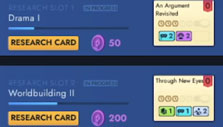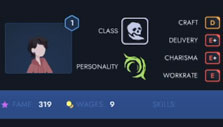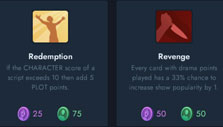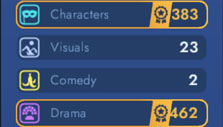Showrunner
 by Aethyna
Feb 26, 2023 |
1
Votes |
56
Played |
0
Reviews
by Aethyna
Feb 26, 2023 |
1
Votes |
56
Played |
0
Reviews
 7
rate
Showrunner is a television series production tycoon where you’ll get to assume the role of a showrunner. Here, you’ll need to hire and manage your staff, upgrade various facilities at your studio, and most importantly, decide on the script of each episode, ensuring that you have everything to create a successful TV series!
Play Now
Similar Games
Played
7
rate
Showrunner is a television series production tycoon where you’ll get to assume the role of a showrunner. Here, you’ll need to hire and manage your staff, upgrade various facilities at your studio, and most importantly, decide on the script of each episode, ensuring that you have everything to create a successful TV series!
Play Now
Similar Games
Played
People Also Played







Summary
Showrunner is a television series production tycoon where you’ll get to assume the role of a showrunner. Here, you’ll need to sign a contract with a publisher of your choice; hire and manage your staff, ranging from writers to the actors or actresses, to even the film crew; upgrade various facilities at your studio, and most importantly, decide on the script of each episode of your show, ensuring that you have all the stats you need to create a successful and well-received TV series!
Gameplay
If you’ve played Game Dev Tycoon or any similar games before, you should be able to feel right at home in Showrunner. Even for someone who has zero knowledge of the going-ons behind her favorite TV series, I was able to pick things up quickly enough because I’ve played similar games before.
In this game, you’ll get to set up a modest TV studio where you can hopefully create a hit TV series that will get more funds rolling in. After deciding on a logo for your studio and its name, you’re ready to start producing your hit show. To do that, you’ll need to decide on a genre, a theme, and a name for your show. The theme doesn’t really matter here, but the genre is crucial. You see, each genre comes with a list of important stats, namely Plot, Characters, Comedy, Drama, Visuals, and Action that range from 1 to 5, with 5 points being “very important” and 1 point being the “least important”. Naturally, if you want your show to be a hit, you’ll then want to hire staff that can help you increase the more important stats.
The basic staff setup in Showrunner includes having at least a writer, a director, an actor or actress, a film crew, and an editor to finalize the episode. In addition to having a Class and Personality that may work synergistically or antagonistically with fellow staff member of different Class and Personality, each role even has traits of varying proficiency that are tied to the stats of your show.
Sometimes, you’ll have to hire two or more staff for the same role just so you have someone to cover for a weakness of the other person. You’ll start off with limited hiring spots though; you’ll get more as your studio level up with every release of a new episode. As you progress, you will eventually unlock higher tier staff, which will let you hire staff with higher starting stats, though usually at twice the cost.
For your actors and actresses, you’ll first need to create a character role for them to play. There are two types of roles – Main and Support, and needless to say, you’ll need at least a Main character before you can start filming your show. For each character, you’ll also get to choose their respective archetypes, such as the “Hero”, the “Antihero”, the “Villain”, the “Underdog”, the “Genius”, and more. Mixing and matching different archetypes in each episode may uncover beneficial character combos, which typically grant you additional genre points that’ll improve your episode’s score. Note that hiring for Main Character will cost twice the amount of Persona Points needed for a Supporting Character, and that you can earn these Persona Points at the end of every episode.
Each archetype comes with a set list of ideal attributes and this is what you’ll need to pay attention to when hiring actors or actresses to fill the roles. Thankfully, the game makes it easy for you to decide this mainly by referring to the Casting rating for each potential hire. The higher the rating, the more proficient the person would be at playing the role. Of course, there are also traits, class, and personality that you’ll want to take into consideration, such as the fact that a Fluid personality works better with someone with a Down-to-Earth personality as opposed to a Fiery one.
Every episode where your actors and actresses are included will increase their experience gained. Over time, they will level up and earn a new trait. You’ll get to choose which trait they will get, allowing them to improve their casting rating or even add vital genre points to your show… that they are involved in, of course.
Different staff will naturally work in different rooms and thankfully, there’s no need for any input from you here since the game will automatically assign them to their respective rooms. To help your staff do their best work, there are many furniture and décor that you can upgrade or change using cash to increase the benefits the items bring to the team working in said room. Eventually, in addition to being able to customize the appearance of each room, you’ll be able to unlock new rooms too. However, being an Early Access title, I was only able to unlock one additional room, the Staff Room, with the others “coming soon”.
During the progression of your show, you’ll get to decide on the season’s theme before Episodes 1, 2, 3, and 5. This means that you can have a total of 4 Season Themes per season of your show. Each Season Theme comes with certain perks and depending on what you need, it’s best to choose the most suitable ones. Note that each Theme will cost some amount of Script and Persona Points, both of which can be earned at the end of a created episode.
Unlike season themes, you’ll need to decide on your script for every episode. Composing a script is as easy as choosing Scene Cards to fill up the slots given. You are given 5 slots in total, but sometimes, you can’t fill them all up. This is because each Scene Card has a Time cost, and you have only so much allotted time (10, specifically) per episode. Due to this, it’s important to choose Scene Cards that will have a good balance of all your important genre points needed so you can get the highest possible script score.
Interestingly, there are special tokens that some Scene Cards need to be used. Scene Cards with a Token cost are something of an investment – they may return your investment with bonus points that will increase your script score for later episodes. Note that each Scene Card also has cooldowns, as in you can’t just use the same combo of cards in every single episode.
You’ll start off with a very limited selection of Scene Cards but you can unlock more via Research. You can have multiple Researches ongoing at the same time, with each Research Slot housing a card set of your choice. Think of it like opening a new card pack, but instead of getting everything in the pack with a single purchase, you’ll have to pay Script Points to reveal each new Scene card in the card pack. Once you’ve spent enough Script Points to reveal all the cards in the set, you’ll then be awarded some studio experience points and be allowed to choose a new card set.
At the end of every episode, you’ll be shown a results screen where you can see the reception of the episode you’ve made, the show’s interest, number of viewers, and episode score. On separate tabs, you’ll also find out how much money, Script points and Persona points you’ve earned, along with any character combos (along with their bonuses) you may have for that episode.
Once the entire season is over, the publisher will then decide if they’d want to renew your series for another season based on your show’s rating and score. Getting a renewal (a Season 2 or more) is the goal here since the terms of your contract will usually be improved by quite a bit, making it easier to earn more points and money. I’m not sure if this will be added into the game eventually, but I’m looking forward to growing my studio to a point where my team is competent and large enough to be able to work on a few TV series in tandem.
Now, as much fun as I had playing as a showrunner in this game, it is an early access title and as such, the game still has plenty of room to improve. For instance, the game really needs to auto-pause the time whenever a pop-up appears. Imagine my chagrin when I realized that I’ve been wasting precious scripting and filming time while I was checking out the result screen of my first episode.
This is super important because as per your contract with the publisher, you have only so many weeks to come up with 10 episodes of your show and if you exceed that time limit, you will earn no money and may end up in debt. There’s also no way for you to currently pull yourself out of debt, so that sucks as well.
In fact, it’d be much better for the player to just decide which staff to include in the production right from the start, and reduce the need for these pop-ups. I also have a bone to pick with the Character names. For some reason, although I've decided on a female Main character, I ended up choosing a male actor to play the role because he's the best fit for the role in terms of stats. It'd be good if the game let us decide on the gender of the character and only show actors/actresses of the corresponding gender in the casting list.
At the moment, due to being in EA, the game also has very little content. I've unlocked everything within less than 2 hours, and despite being renewed for Season Three, I'm no longer motivated to continue the grind since I won't be unlocking anything new besides levels. However, from the many placeholders in the game, I can see that the devs have plenty of new stuff in store for players, so there are plenty to look forward to, that’s for sure!
Graphics/ Sound
The cartoonish graphics in Showrunner is fairly similar to Game Dev Tycoon, albeit with more muted colors. Besides the many 3D assets in the game, the art style for both the icons and the cards used here look great too. In terms of sound, the game features a chill selection of soundtracks that work well with the theme. There are plenty of sound effects too, either to let you know what’s going on or if something has been purchased successfully.
Conclusion
All in all, Showrunner shows a lot of promise as an Early Access title. The concept of the game may be inspired heavily by Game Dev Tycoon and other games like it, but the theme is refreshingly unique and gives players a peek behind the curtain as to what happens behind their favorite TV shows. However, the game still has plenty of room for improvement in terms of its content and gameplay, and hopefully, all the issues raised will have been addressed by the time Showrunner is ready for launch.
Showrunner Blog
New Game Added: Showrunner
 by Aethyna
Feb 26, 2023
by Aethyna
Feb 26, 2023


 Read More
Read More
Featured Games
 Realm of Warriors
Assemble a party of the strongest heroes to take on both the rebel forces and the corrupting influence of the Dragon Demon in this Chinese-themed browser MMORPG, Realm of Warriors!
Realm of Warriors
Assemble a party of the strongest heroes to take on both the rebel forces and the corrupting influence of the Dragon Demon in this Chinese-themed browser MMORPG, Realm of Warriors!
 RAID: Shadow Legends
Recruit the best to join your team and take on Siroth, the Lord of Darkness himself!
RAID: Shadow Legends
Recruit the best to join your team and take on Siroth, the Lord of Darkness himself!
 Hustle Castle
Save the king and his daughter from the abyssal lord as he threatens to destroy your kingdom and marry your bride to be in this fun mmo simulation game.
Hustle Castle
Save the king and his daughter from the abyssal lord as he threatens to destroy your kingdom and marry your bride to be in this fun mmo simulation game.
 Dark Genesis
Play Dark Genesis and save the world from destruction with your allies.
Dark Genesis
Play Dark Genesis and save the world from destruction with your allies.
 War Robots
Head into the cockpit of a mech and decimate opponents in War Robots.
War Robots
Head into the cockpit of a mech and decimate opponents in War Robots.
 Blade of Kings
Blade of Kings is an idle RPG by Esprit Games. You’ll take a role of a warrior, defending the land from hordes of monsters and attempting to rise in rank in the kingdom. Take part in action-packed idle battles, use a variety of skills, raise pets, and achieve victory.
Blade of Kings
Blade of Kings is an idle RPG by Esprit Games. You’ll take a role of a warrior, defending the land from hordes of monsters and attempting to rise in rank in the kingdom. Take part in action-packed idle battles, use a variety of skills, raise pets, and achieve victory.













